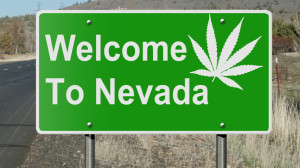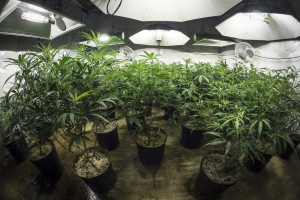 The legal battle over who can transport recreational marijuana to Nevada’s cannabis shops continues. Earlier last week, the Nevada Supreme Court issued a temporary injunction against the state’s newfound marijuana market; the state Department of Taxation is now unable to license marijuana businesses as distributors.
The legal battle over who can transport recreational marijuana to Nevada’s cannabis shops continues. Earlier last week, the Nevada Supreme Court issued a temporary injunction against the state’s newfound marijuana market; the state Department of Taxation is now unable to license marijuana businesses as distributors.
A request by the Tax Department for the temporary injunction sought by alcohol distributors was denied by the Supreme Court. The court also rejected the Independent Alcohol Distributors of Nevada’s request to dismiss the case. So, the big question remains: will other businesses have just as much right to transport recreational weed to retail facilities as the alcohol trade?
The Nevada Supreme Court has placed this hold on distribution until it can hear oral argument from both sides. This hearing to settle who is allowed to distribute recreational cannabis is scheduled for the beginning of October 3 at Boyd School of Law at UNLV. This legal battle has been going on since June – when liquor distributors sued to stop the licensing of marijuana companies to do their own distribution – and neither group is showing signs of giving an inch.
According to the Las Vegas Review Journal, “Alcohol distributors argue that they have the exclusive right under Question 2 to distribute recreational marijuana from grow facilities to retail establishments for 18 months. The Tax Department found that the liquor industry was unable to fulfill the distribution demands so it had to license other companies.”
This issue has already had negative effects on the marijuana merchants and the market as a whole. With all the legal snags, the state’s overall cannabis supply has suffered. So much so that Governor Brian Sandoval issued a Statement of Emergency over the summer to try and boost distribution of recreational marijuana to avoid people resorting to the black market.
Another huge issue merchants and medical marijuana businesses experience is finding payment processing solutions. Marijuana merchants in need of business funding and payment processing can find fast solutions with alternative lenders like Marijuana Merchant Account (MMA). Specializing in this industry, MMA can provide funds in as little as 24 hours. The “high risk” nature of the industry is not a problem.
The expectation is that this legal battle will be resolved by the end of this year, which will hopefully improve the atmosphere for all parties involved – including marijuana merchants.


 The use of cannabis in the U.S. has been increasing rapidly over the last decade. However, you might be surprised to hear that it is not because of legalization. A recent study in the journal Addiction confirms that the growing number of state laws and pro-pot policies – that allow legal use of both medical and recreational marijuana – are not the reason behind increased usage.
The use of cannabis in the U.S. has been increasing rapidly over the last decade. However, you might be surprised to hear that it is not because of legalization. A recent study in the journal Addiction confirms that the growing number of state laws and pro-pot policies – that allow legal use of both medical and recreational marijuana – are not the reason behind increased usage.
 Next year, billions of dollars are expected to flood the California’s marijuana industry when recreational cannabis is made legal. Even so, these businesses will struggle to secure the services they need with their local banks. But why would such a profitable industry with so much potential experience issues securing solutions with a traditional lender?
Next year, billions of dollars are expected to flood the California’s marijuana industry when recreational cannabis is made legal. Even so, these businesses will struggle to secure the services they need with their local banks. But why would such a profitable industry with so much potential experience issues securing solutions with a traditional lender? What do you think about when the term “medical marijuana” comes up? Cancer patients? Fibromyalgia? Pets? The latter is probably not going to be one of the first things that hits your mind, but more and more people are turning to legalized marijuana in various forms to help heal and calm their cats and dogs. Does it work? Perhaps – but the idea is novel and it can help boost your business.
What do you think about when the term “medical marijuana” comes up? Cancer patients? Fibromyalgia? Pets? The latter is probably not going to be one of the first things that hits your mind, but more and more people are turning to legalized marijuana in various forms to help heal and calm their cats and dogs. Does it work? Perhaps – but the idea is novel and it can help boost your business. All it took was one trip for a Tennessee lawmaker to decide that legalized marijuana was a good idea for his state. Representative Jeremy Faison said that his mind changed after a trip to Colorado a few months ago. Since neighboring state Georgia has legalized CBD oil for medicinal use (for certain ailments), he wants his state to be next in line. This is a great idea – but with all great ideas, this isn’t going to be an easy task.
All it took was one trip for a Tennessee lawmaker to decide that legalized marijuana was a good idea for his state. Representative Jeremy Faison said that his mind changed after a trip to Colorado a few months ago. Since neighboring state Georgia has legalized CBD oil for medicinal use (for certain ailments), he wants his state to be next in line. This is a great idea – but with all great ideas, this isn’t going to be an easy task. With all of the states voting on medical marijuana, either this year or the years’ past, did you ever think that Arkansas would be one of these? A Bible belt state that is one of the most conservative in the US, Arkansas voters will decide in a few short weeks if medical marijuana will be legalized. While this is sure to be controversial, medical marijuana has been successful in over 20 other states – and their governments are reaping the tax benefits.
With all of the states voting on medical marijuana, either this year or the years’ past, did you ever think that Arkansas would be one of these? A Bible belt state that is one of the most conservative in the US, Arkansas voters will decide in a few short weeks if medical marijuana will be legalized. While this is sure to be controversial, medical marijuana has been successful in over 20 other states – and their governments are reaping the tax benefits. While legalization of marijuana in many forms – and in many states – garnered over $5 billion dollars in 2015, the sums are expected to grow for 2016. More unique products are being created, and the stigma that once surrounded reefer is slowly fading. These changes are helping the industry to boom, even though it is still a federal offense to sell, grow, or possess it. The Feds are hating this legalization, but they must be loving the taxes that the government is gaining from these sales.
While legalization of marijuana in many forms – and in many states – garnered over $5 billion dollars in 2015, the sums are expected to grow for 2016. More unique products are being created, and the stigma that once surrounded reefer is slowly fading. These changes are helping the industry to boom, even though it is still a federal offense to sell, grow, or possess it. The Feds are hating this legalization, but they must be loving the taxes that the government is gaining from these sales.
 It has been 20 years since Californians approved Proposition 215, the medical marijuana policy that allows for growth and distribution of the drug to designated patients. Since then, the growth and distribution of medical marijuana has been controlled by local entities. But it was only last year that the state approved the Medical Marijuana Regulation and Safety Act, a group of bills that attempts to regulate medical marijuana on a state level. The act seeks to control the cultivation, manufacturing and licensing of medical marijuana, but maintains local government’s sovereignty over marijuana businesses, cultivation, and delivery. But an erroneous deadline in the bill allows local governments to ban medical pot cultivation, dispensaries, and mobile delivery. This has made many patients who have depended on the drug for treatment nervous.
It has been 20 years since Californians approved Proposition 215, the medical marijuana policy that allows for growth and distribution of the drug to designated patients. Since then, the growth and distribution of medical marijuana has been controlled by local entities. But it was only last year that the state approved the Medical Marijuana Regulation and Safety Act, a group of bills that attempts to regulate medical marijuana on a state level. The act seeks to control the cultivation, manufacturing and licensing of medical marijuana, but maintains local government’s sovereignty over marijuana businesses, cultivation, and delivery. But an erroneous deadline in the bill allows local governments to ban medical pot cultivation, dispensaries, and mobile delivery. This has made many patients who have depended on the drug for treatment nervous.